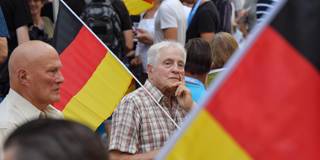Eastern Germans vote, think, and feel differently than western Germans do, as the results of the September 1 regional elections make clear. To help tackle the underlying economic causes of this divide, the federal government should introduce incentives to encourage foreign investment in the east of the country.
MUNICH – This November, Germany will celebrate the 30th anniversary of the fall of the Berlin Wall. But the country is in a gloomy mood, and cheers will be few and far between – especially in the east.
Today, more than one-third of eastern Germans describe themselves as second-class citizens. Contrary to their expectations at the time of German reunification in 1990, the east of the country has not become as prosperous as the west. Unsurprisingly, eastern Germans today think, feel, and vote differently than western Germans do. In fact, Germany is one country with two souls.
The latest evidence of this came on September 1, when the xenophobic right-wing Alternative für Deutschland (AfD) secured a strong second place in regional elections in the eastern German states of Saxony and Brandenburg, with 27.5% and 23.5% of the vote, respectively. In western German states, the AfD’s electoral share is typically half of that.

MUNICH – This November, Germany will celebrate the 30th anniversary of the fall of the Berlin Wall. But the country is in a gloomy mood, and cheers will be few and far between – especially in the east.
Today, more than one-third of eastern Germans describe themselves as second-class citizens. Contrary to their expectations at the time of German reunification in 1990, the east of the country has not become as prosperous as the west. Unsurprisingly, eastern Germans today think, feel, and vote differently than western Germans do. In fact, Germany is one country with two souls.
The latest evidence of this came on September 1, when the xenophobic right-wing Alternative für Deutschland (AfD) secured a strong second place in regional elections in the eastern German states of Saxony and Brandenburg, with 27.5% and 23.5% of the vote, respectively. In western German states, the AfD’s electoral share is typically half of that.